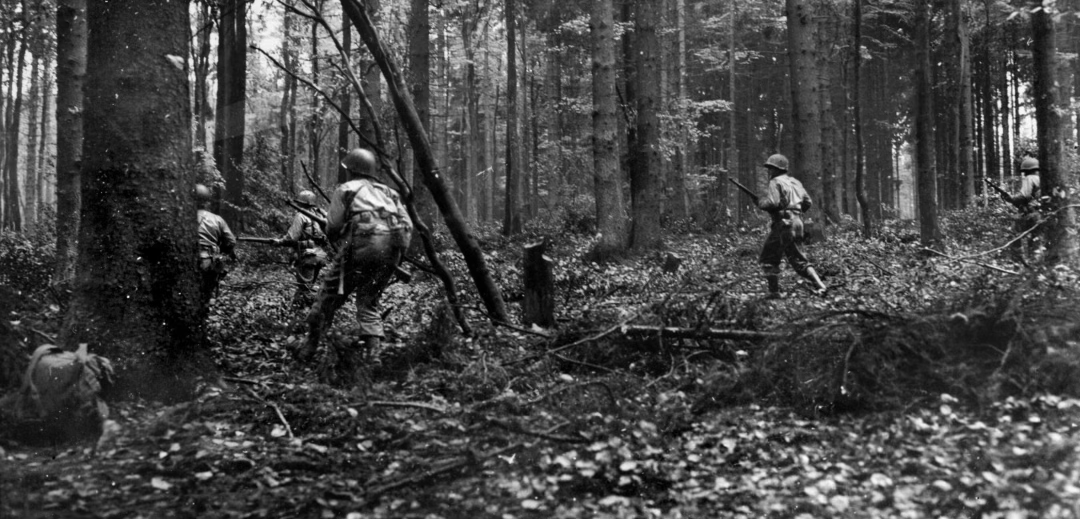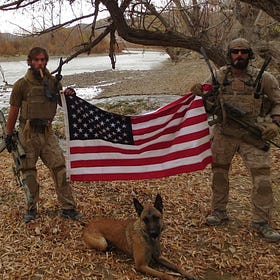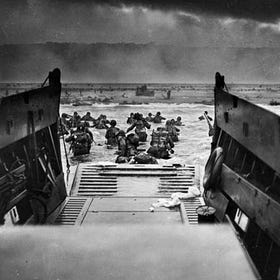Veteran’s Day 2025: Why Americans Fight in Silence
German POWs, James Jones, and compassion
I added a PDF version for those who dig paper over pixels. If you find this helpful, I’ll add them going forward.
To my international friends, allow me a bit of poetic license for this piece.
To my American friends, let’s lean into it.
Today is Veterans Day in America.
America is confused about itself. It has always been confused, and this is its strength—its reflective capacity. But this reflection was always with an eye to the greatness that lay in our future, whereas now it is about a few evil deeds that lay in our past. We hear scandalously intellectual arguments as to why America is rotten to its core and ought to have its roots ripped out. There exists a doubt. An atrophy. Even a hatred.
So let us look to the past.
It is obvious this self-hating view of our past is selective. It does not consider what is unique about America. Another perspective on America as a whole may be found within the history of our warfighters.
I read a short and striking anecdote from German POWs in WWII and it got me thinking.
James Jones, veteran of WWII and author, wrote “German prisoners, asked to assess their various enemies, have said that the British attacked singing, and the French attacked shouting, but the Americans attacked in silence. They liked better the men who attacked singing or shouting, than the grimly silent men who kept coming on stubbornly without a sound.”1
What, then, is the significance of this American silence? And why does it matter on Veteran’s Day in the year 2025?
Let us compare what these German soldiers may have seen and felt.
Imagine being a German soldier and hearing the enemy sing amid bullets, mortars, mines, and super-sonic death at mass scale. How is this possible? I had the pleasure of doing a bit of work with the British SBS, their version of US Navy SEALs, when they joined us for a training exercise. We swam in from the surf, rucked through sand dunes, and dropped bombs from jets overhead. I was in awe of their “Lace up your boots, lads!” and their cigarettes and their incredibly nice manners and how they treated this brutal exercise as if it were a jolly good show, chap. I wondered about their lineage—maybe this singing came from their forebears. While fighting Nazi’s, it was said the Brits “were trying to make a name for themselves, earn medals, and they died by the bushel.”2 What, then, was singing in war? Perhaps the Germans thought it was a way to say life is a game and death is romantic, a way to more easily sacrifice life in the insanity of war.
Now imagine you are the same German a little later in the battle. You hear the forest erupt not in singing but in the savage screams of Frenchmen. The Germans probably understood this form of motivation, since it harkened back to their Frank, Goth, and Saxon blood. They knew the Frenchmen could feel the adrenaline flooding their veins; they knew they were savoring the smell of cordite and the craze, the wrath, the screams of war—screams that drown out the inner discourse. A bloodied throat feels primal and sends images to the mind’s eye of tooth and blade and bone and blood and it feels right, almost as if God is on our side. So what was a Frenchman’s scream? Maybe it was to look in the forest and know that death lies there, just over there, and yet still risk it all because it feels savagely good to trade life for blood.
At last, the singers and screamers have come and gone. Now imagine you are gazing into the forest and hear… nothing. No godlike delusion. No jolly good shows. I imagine it crawled under their skin; the hair raised on the back of their necks; a little voice started wailing deep within their frontal lobes. I can see still-frame images of olive-drabbed GI’s leaping logs in the light of their yellow muzzle-flashes. I can see the forest canopy above mushrooming into millions of minuscule fragments of bark and leaf and steel like underwater flower pedals. I can feel the cold bone hand of death as these warriors emerge from the woods and advance foot by foot, inch by inch—in silence. The Germans must have realized these silent savages were not accustomed to thousands of years of domination and submission to kings and tyrants; that these men owned their individual fates and followed no orders blindly; that they did not want to be in yet another World War that was none of their making; that each was willingly and consciously risking his life, and doing so in silence.
The Germans may have thought these Americans were silent because they held a deep and reverent respect for human life.
And yet I do not think we have gone deep enough here. German soldiers in concrete pill boxes would not be afraid of nice Americans who loved life so much they were willing to die for it. There is something more.
America is a land of extremes. The most embarrassingly obese, and yet the greatest champions of the Olympics. The most wealthy, and yet the most charitable. The most navel-gazing nation in history, and yet willing to bleed entire generations to end World Wars. The most compassionate, and yet there has never existed a more warlike nation: a Spartan Hoplite cannot hold a candle to a Marine infantryman, and a Roman Legionnaire cannot stand toe to toe with an Army Ranger.
So how do we reconcile this land of extremes and understand what terrified the German prisoners?
Through a paradox: the American warfighter’s unprecedented compassion for life is precisely why he is capable of inflicting such extraordinary violence upon his enemies. Anyone who has ever seen a mother whose children are threatened knows what I mean. I believe this is a human universal: our greatest weakness is our greatest strength—the greater our reverence for human life, the more mercilessly lethal we become.
This is what scared the fuck out of mass murdering Nazi’s. This is what paled the faces of men who shot, burned, starved, stabbed, raped, hanged, hacked, and gassed tens of millions of innocent men, women, and children to death. This is what made not a few of them put a bullet in their own skulls rather than look one of these silent twenty-two year old men in his eyes.
I believe in my bones America is not a place—it is an idea. I am certain that if the idea of America dies, it will not have died from the outside in some bloody trench, but from the inside with social media, petty tribalism, bored intellectuals, and a minority that simply wants to see it all burn to ashes.
No nation’s history is perfect. But no nation’s history is as noble, decent, and principled as America’s as seen through the lens of her compassionate veterans.
For my part, this is the value of Veterans Day in the year 2025.
If you enjoyed this, please consider adding a like, restacking this essay, and sharing it with others.
This is how more readers find my work.
Jones, James. WWII: A Chronicle of Soldiering. University of Chicago Press, 2014.
O’Donnell, Patrick K. Operatives, Spies, and Saboteurs: The Unknown Story of the Men and Women of World War II’s OSS. Free Press, 2004.






Sam, I am saying “Thank You for your service” in silence. You and other veterans know what it means when you catch a gaze into your eyes. America is going through a low point right now. Our abundance and not knowing history lead us to it. But a pendulum always returns. We must have faith in our American idea.
The G.I.s were silent not just in the attack but on the stretcher as well. I can't remember which account I read it in, perhaps Frank Irgang's *Etched In Purple*, but while the Germans cried and shouted in the pain of their wounds, the Americans were said to lie there silently, waiting for healing or the end. They were not maudlin Hollywood characters bawling for their mothers. And yet these silent men were not dour or grim. The citizens of Maastricht wrote to the NYT upon their liberation,
"The pleasant smile of your boys has stolen our hearts. Their laughing faces, their vigorous and brave appearance, their kindheartedness and especially their simplicity have told us that these sons of the great American Republic bear true democracy in their hearts and that the world may be glad the United States has interested itself in behalf of our country and of Europe."
I met many of those men in my youth and they smiled just as much and were just as silent.